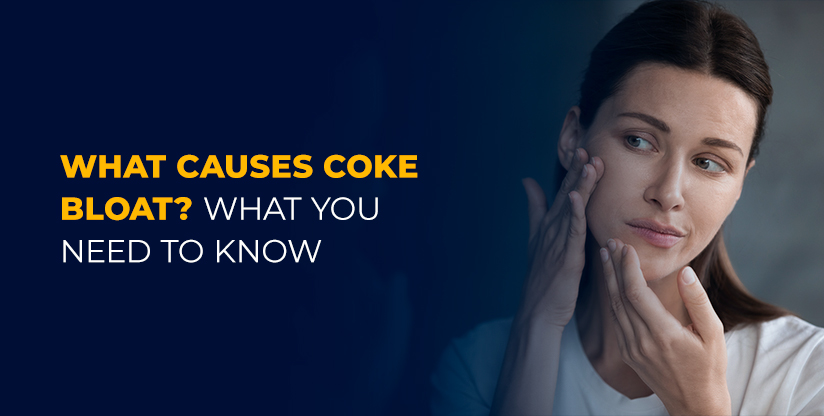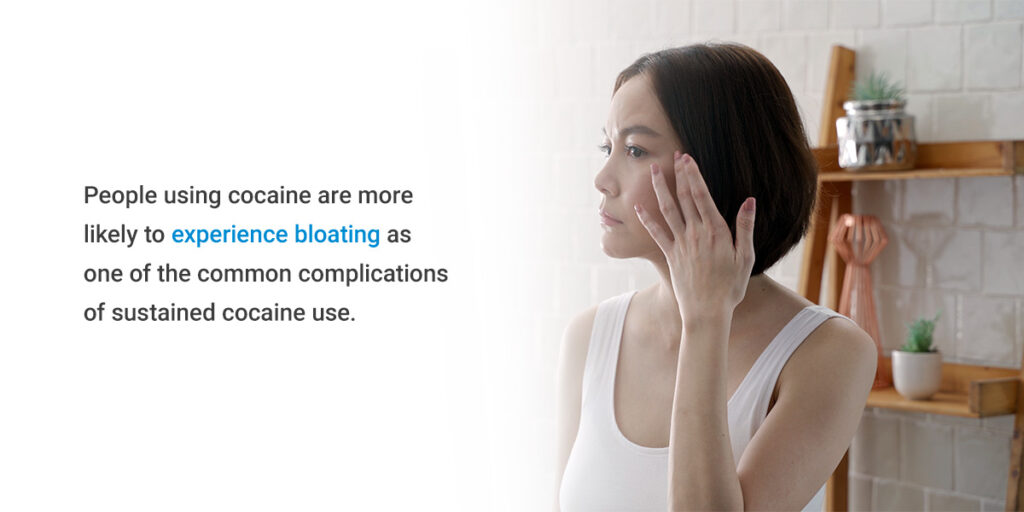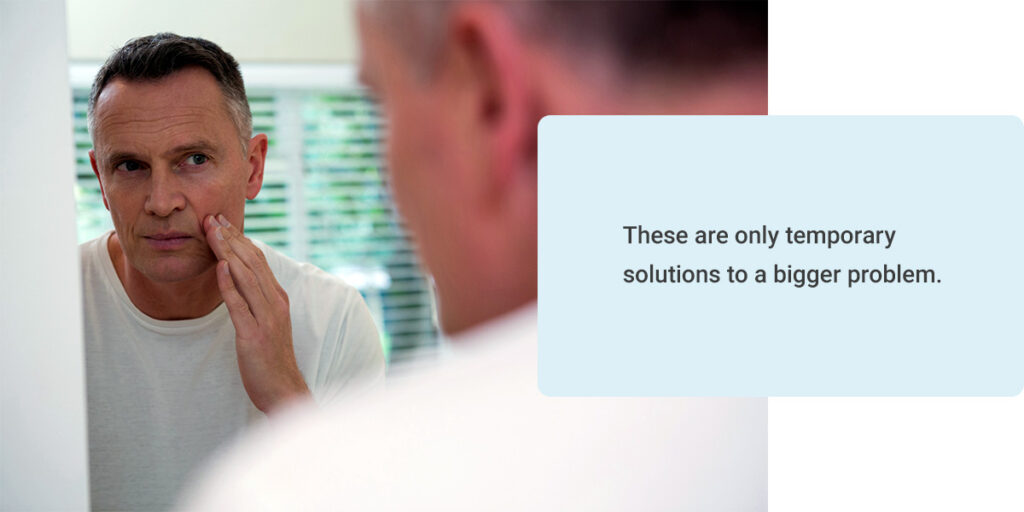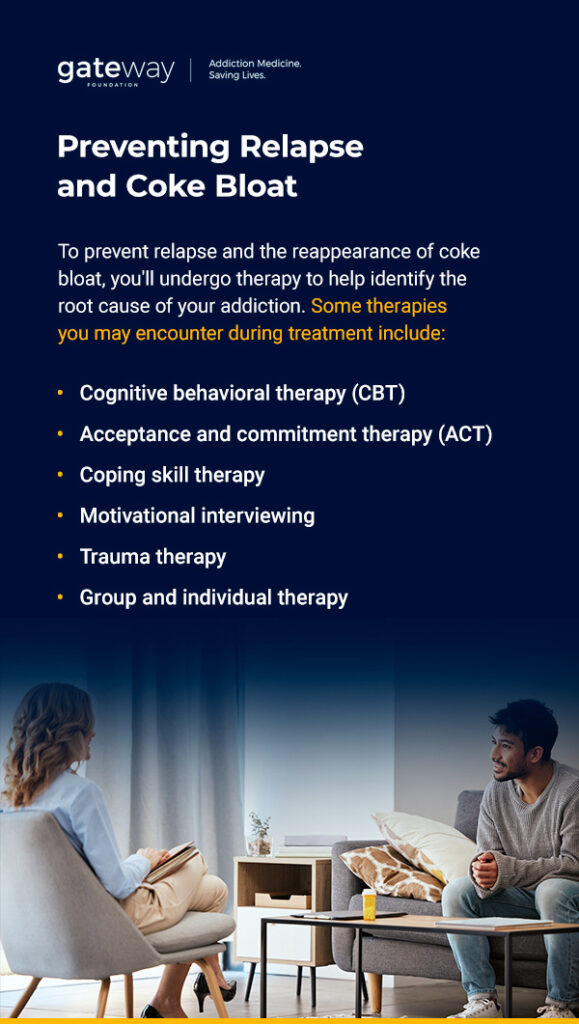- Nov 10
- AddictionDrug Addiction Treatment

Cocaine is a powerfully addictive drug that can create numerous severe side effects. Once a person becomes addicted to the illegal drug, they can experience physical, mental and emotional changes that take a toll on their quality of life. One of these changes includes facial puffiness, often referred to as coke bloat.
Coke bloat can alter the appearance, affecting one’s self-esteem and perception of self-worth. The impact of coke bloat on one’s self-esteem can lead to continued use of cocaine. Below, we’ll review the coke bloat definition and cause, how to get rid of the symptoms and steps to overcome addiction.
What Is Coke Bloat?
Cocaine is an illicit stimulant drug derived from the coca plant in South America. Cocaine found on the streets appears as a white powder, and it is often “cut” or mixed with other things, such as talcum powder or cornstarch, as a way to increase profits.
Coke bloat refers to facial puffiness or bloating after someone uses cocaine. The bloating or puffiness is most apparent in the cheeks or under the chin. Due to media representation of cocaine use, many imagine people using cocaine with a sickly appearance, thin and weak. Coke bloat can cause a person to look like they’ve gained weight since it causes bloating in the face.
Normal Bloating vs. Coke Bloat

Regular bloating can occur for numerous reasons. A person may bloat in the stomach after eating a big meal, a build-up of gas or menstruation. Some people can experience regular facial bloating from a lack of sleep, allergies and high sodium diets. Dehydration can also cause bloating. When you don’t get enough water, digestion can slow or stop, holding onto any excess water in the body to counteract the effects. The more dehydrated you become, the more likely you will experience some usual bloating.
Coke bloating is different because the use of cocaine directly causes it. Cocaine use can cause the blood vessels to constrict, causing lymphatic fluid to build up in the narrowed vessels, which can contribute to bloating or swelling.
Additionally, narrowing blood vessels due to cocaine use can cause peritonitis, which is inflammation in the abdomen’s interior lining. As a result, individuals using the substance could experience bloating as a symptom.
While usual bloating and cocaine bloating can appear similar, people using cocaine are more likely to experience bloating as one of the common complications of sustained cocaine use. This bloating can affect a person’s overall appearance with long-term use, which can harm a person’s self-esteem and could influence continued use to cope with these feelings.
How Cocaine Use Can Lead to Bloating
There are numerous reasons a person could experience coke bloat. In people using cocaine, bloating can be caused by hormonal and fluid retention problems when the individual drinks water. One of the main reasons bloating could occur is when the coke a person uses isn’t pure.
As we briefly mentioned above, cocaine can be cut with other substances to increase revenue without selling as much of the legitimate product. Levamisole has become more common to find cut with cocaine, a deworming medicine found in veterinary offices. Around 70% of cocaine in the United States is mixed with deworming medication.
When humans take Levamisole, it can cause numerous side effects, such as skin necrosis or dying skin cells, seizures, abdominal pain and joint pain. Another common symptom of this medication is swollen glands, including the parotid gland in front of the ears. When these glands swell, it can create the swollen or puffy appearance called coke bloat.
Additionally, snorting cocaine can cause inflammation and irritation in the nasal passage, contributing to a bloated or puffy appearance. Bloating can also occur when lymphatic fluid accumulates around the face from restricted blood vessels, altering the individual’s appearance.
Is There a Way to Get Rid of Coke Bloat?

In general, people do not find coke bloat physically painful. There are some claims about how you can get rid of bloating from cocaine use, but empirical studies back none. However, they could be worth giving a try if you’re experiencing bloating or puffiness:
- Try massaging your face in gentle circles for five to 10 minutes daily, applying a cooling mask after to help soothe inflammation.
- Apply a cold compress throughout the day or take a cold shower to relieve inflammation.
- Apply hydrocortisone cream to help with the swelling.
- Use a derma roller on your face to target bloated skin.
These aren’t guaranteed fixes for coke bloat, and they may not work for everyone. In most cases, these are only temporary solutions to a bigger problem.
The best way to fix coke bloat is to stop using cocaine altogether. Since the drug is the primary culprit for the swelling and bloating, ceasing the use of the drug is the best way to rectify the problem.
How Professional Treatment Can Help You Eliminate Coke Bloat
The good news is the coke bloat will go away if you stop using cocaine. It’s best to seek professional treatment for cocaine addiction to reduce the risk of relapse and get to the root cause of the substance use.
But what does professional treatment for cocaine use look like?
You’ll start with an assessment process. An addiction specialist will ask you questions regarding your substance use disorder, such as when you started taking the substance, how often you use it, what your average dose is and under what circumstances you tend to use the drug. These questions help an addiction specialist determine the severity of your addiction and whether any co-occurring conditions could be contributing to your addiction.
Once you complete the assessment, the addiction specialist will work with you to create a customized treatment plan that suits your unique needs. The next step of a drug addiction treatment program is detoxing from the substance. Withdrawal management and medication-assisted detox are services you can utilize to get through the withdrawal symptoms and prevent relapse while the cocaine clears your body.
Once the cocaine starts to leave your system, you should notice the symptoms of coke bloat going away. It’s the only surefire method to eliminate the bloating or puffiness from using the drug. It’s essential to continue treatment even once the symptoms have gone away to support overall recovery and ensure you don’t relapse, which could also trigger coke bloat to reappear.
Preventing Relapse and Coke Bloat

To prevent relapse and the reappearance of coke bloat, you’ll undergo therapy to help identify the root cause of your addiction. Some therapies you may encounter during treatment include:
- Cognitive behavioral therapy (CBT): A CBT program looks at your current thoughts, beliefs and values and how they contribute to your addiction. Negative thoughts and ideas can influence negative behaviors, such as cocaine use. CBT aims to modify how you think to promote more rational thoughts that are based on facts and evidence, rather than fears, by focusing on the present over the past.
- Acceptance and commitment therapy (ACT): Some people experiencing cocaine addiction treatment may find it challenging to accept their emotions, the state of their addiction or the road to recovery. ACT programs help individuals accept where they are in life and help them commit to their recovery, making it easier to focus on the potential for the future.
- Coping skill therapy: Learning different coping skills can help you manage your triggers when you reenter society, making it less likely for you to relapse. You may learn different coping mechanisms in coping skills therapy, including exercise, yoga, meditation, journaling or art therapy.
- Motivational interviewing: Some who enter treatment may not want to be there or are in denial of their addiction — motivational interviewing focuses on the individual’s readiness for change by helping them see the problems with substance use and the benefits of professional treatment, helping them get on board with recovery.
- Trauma therapy: Some people’s addiction results from a traumatic experience, and they may start using drugs like cocaine to cope. Trauma-informed therapy helps address the traumatic events of a person’s life and to begin processing their trauma, which can result in a decreased perceived need to use a substance as a way to cope.
- Group and individual therapy: While you’ll participate in individual therapy while in treatment, you’ll likely also participate in group therapy with others who share similar experiences. Group therapy helps you connect to individuals who understand your struggles, providing a built-in support network you can lean on when you experience challenges in your recovery.
Once you complete your therapy at an inpatient or outpatient addiction treatment program, you’ll work with a specialist on a relapse prevention plan that outlines your triggers and ideal responses to these situations to prevent you from turning to cocaine. You’ll also list the contact information of members from your support group you can call for ongoing support or if you feel close to relapse.
Remember that the single best way to get coke bloat to go away is to quit using cocaine. On top of coke bloat, cocaine can also cause a higher risk for heart problems, brain damage and kidney failure, just to note a few risks of cocaine use. A professional addiction treatment center can help you find relief and get rid of coke bloat for good.
Should I See a Doctor About Coke Bloat?
While coke bloat may not be a serious issue independently, it can indicate a more severe condition that requires medical attention. Cocaine can affect more than just your appearance, such as your heart, as well as other severe possible symptoms or conditions. Seek medical assistance if you experience one or more of the following:
- Swelling in the feet, ankles or legs
- Shortness of breath
- Chest pain
- Fever, joint pain and fatigue
- Coughing up blood
- Consistent coughing or wheezing
Cocaine can also cause respiratory issues, especially if a person injects or smokes the substance. This can lead to lung bleeding, also known as a pulmonary hemorrhage, creating numerous health issues. Anyone experiencing these symptoms should seek immediate medical help.
You should always be open and honest with health care professionals to ensure they provide the best care possible. Doctor-patient confidentiality laws prevent your physician from reporting substance use to the authorities, so you don’t have to worry about law enforcement intervention if you seek medical help.
How Does Cocaine Use Affect Your Skin?
Cocaine affects multiple systems in the body, including the heart, lungs and other organs. Cocaine also affects the skin, the largest organ in the human body. The impact on the skin is more noticeable from long-term use but can still appear if someone has only taken cocaine for a short period.
Cocaine use constricts the blood vessels, reducing the supply of oxygen and nutrient-rich blood to various body parts. Due to the lack of oxygen and nutrients, the skin on your face may look sunken, aged or pale, creating the opposite appearance of coke bloat. Either reaction can happen in response to prolonged cocaine use.
Other skin effects include:
- Slow healing: A lack of adequate blood flow can cause problems with cellular regeneration, which is essential for healing bodily wounds and injuries. It can make it more challenging to handle acne or blemishes that appear and make you appear older since cellular regeneration is critical for keeping the skin looking youthful and fresh. Improper wound healing can increase the likelihood of scarring, further impacting the skin’s appearance.
- Skin necrosis: On top of problems with cellular regeneration, sustained cocaine use can cause issues with skin necrosis, especially when it’s cut with Levamisole. Skin necrosis is when skin cells die, which could cause brown patches to appear on the skin’s surface. Constricting blood vessels from cocaine use can also contribute to this problem since cells don’t have enough oxygen or nutrients to heal, preventing the supply of enough white blood cells. As a result, skin necrosis could spread, which could be life-threatening — people using cocaine should seek immediate medical treatment if signs of skin necrosis are present.
- Condition flare-ups: People with different skin conditions, such as rosacea, eczema and psoriasis, may see more flare-ups when using cocaine due to the drug’s ability to constrict blood vessels. Individuals with a cocaine addiction may be less motivated to stick to a skin care routine. Even if a person doesn’t experience any damaging effects to the skin from cocaine use, failing to keep up with skin care can cause more frequent acne outbreaks, dull skin, clogged pores and dryness.
With the many ways that cocaine affects the body and skin, it’s best to quit using it to prevent lasting damage. Working with an addiction specialist is the best way to ensure your skin, body and mind stay as healthy as possible.
Find Relief From Cocaine Addiction with Gateway Foundation
Cocaine does more than affect your skin. Regular cocaine use also increases your risk for various conditions that affect the heart, liver and brain, and addiction affects your mental and emotional well-being. The best way to combat the effects of cocaine use is to seek addiction treatment.
Gateway Foundation is a professional addiction treatment center that can help you on your road to recovery from addiction and all its challenges. Our addiction specialists can help you get the personalized care you need to overcome addiction. We have various levels of care to accommodate different severities of addiction, with multiple therapy options to get to the root cause of your cocaine use.
Contact us today to learn more about our program and how we can help.



